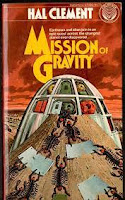I am among the group of people who believe that what is commonly referred to as the Silver Age of science fiction is in fact the Golden Age. What was being published in the 20s-40s is better described as the Pulp era. But I get it. The color nicely complements the image of a sleek, finned space ship pointed skyward, bringing mankind to the frontiers of the unknown, there to continue doing what mankind does best: explore, discover, conquer, and be clever—the optimists' view. Encapsulating that image wonderfully is Hal Clement's innocent Mission of Gravity (1954).
One of the original hard sf texts, Mission of Gravity is set on an oddly shaped planet where gravity is 3x Earth-standard at the equator and 700x at the poles. Populated by a centipede-esque alien race (better to maintain grip on the surface, natch), the novel opens with a human scientist, named Lackland, in need of help from them. A science probe lost deep in the ultra-gravity zone, Lackland embarks on a journey with one of the centipedes, named Barlennan, to retrieve it. Adventure, as they say, ensues.
For people who like the idea that science fiction is a fiction of ideas, Mission of Gravity is for you. Physics and scientific extrapolation far outrank characterization and the human experience in the book's hierarchy of priorities. The planet has more character than the characters. Not helping this is Clement's style. As basic as basic is, the diction is plain, to say the least. Clement has zero desire to include nuance, panache a pipe dream.
As with a lot of Silver Age science fiction, there is an inherent optimism to the situations and challenges our human protagonist Lackland encounters. Pragmatic, the book sets a mold for humanity encountering the unknown—not the horrific unknown, rather the surpassable unknown, a bullish view wherein science and logic win the day. And the optimism persists; the story's denouement is about compromise and working together. The reader can feel the sunbeams of 1950s Americana shining on the story. (Norman Rockwell in space?) This is not a criticism, only an observation that were Clement's diction to have had several more degrees of sophistication, the innocence of the story would have shifted from juvenile toward—toward--relevancy.
Point blank, there isn't enough realism in Mission for a humanist reader to get a foothold. Realism in this case does not equate to dystopia or nihilism, rather (dare I say it) gravitas. For example, having 2D characters would have helped, not to mention an authorial awareness beyond escapism of the purest distillate. The aliens are not very alien, for example. While physically different, they are mentally equivalent to humans. A book not a film, Clement could have included more description to its benefit.
To emphasize the importance of relevance, I would contrast Mission of Gravity with Christopher Priest's Inverted World. Both are books centered around semi-realistic, extrapolative conceptions, but Priest goes further to ground his tale in a theme that relates to the humanity his story features. Clement's novel lacks this layer of narrative and execution to help it transcend era and escapism.
In the end, Mission of Gravity is a novel that set hard sf trends in its day but has not retained relevancy save as a museum piece. The setting is developed and the story has spots of well-paced fun, but all else feels wooden and forced. There isn't enough between the lines to allow the novel to be more than palabum. Interesting as an idea and colorful for adventure, but ultimately this is a book for the niche of readers who enjoy the abstractedness of old school worldbuilding for worldbuilding's sake.


No comments:
Post a Comment